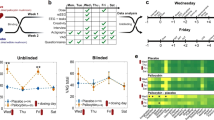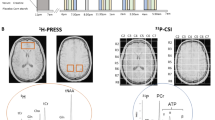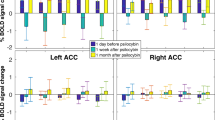Abstract
Background
Internalizing and externalizing problems have received great attention, and children with ADHD exhibit high rates of comorbid internalizing and externalizing disorders. This study aimed to explore the relationship between sleep and internalizing problems in children with attention-deficit hyperactivity disorder (ADHD) and the probable mediating role of externalizing problems.
Methods
A total of 203 primary school children diagnosed with ADHD for the first time were recruited for this study. Children with ADHD were evaluated by Children’s Sleep Habits Questionnaire (CSHQ), Strengths and Difficulties Questionnaire (SDQ). Internalizing problems were represented by emotional symptoms and peer problems of SDQ, and externalizing problems were represented by conduct problems and hyperactivity-inattention problems of SDQ. Multi-step linear regression analysis was used to investigate the mediating effect of externalizing problems on the relationship between sleep and internalizing problems.
Results
Sleep in children with ADHD was associated with emotional problems in internalizing problems, and conduct problems in externalizing problems mediated the association between sleep and emotional problems.
Conclusion
For children with ADHD, when it is difficult to identify internalizing problems, especially emotional problems, we can take sleep and externalizing problems as clues to improve our clinical ability to recognize and deal with emotional problems.
Impact
-
1.
We first explored the possible mediating role of conduct problems between sleep and emotional problems in primary school children with ADHD.
-
2.
When it is difficult to identify internalizing problems, especially emotional problems, we can take sleep and externalizing problems as clues to improve our clinical ability to recognize emotional problems for children with ADHD.
-
3.
For children with ADHD with potential internalizing problems, especially emotional problems, interventions for their sleep and externalizing problems may be the possible methods to deal with.
This is a preview of subscription content, access via your institution
Access options
Subscribe to this journal
Receive 14 print issues and online access
$259.00 per year
only $18.50 per issue
Buy this article
- Purchase on Springer Link
- Instant access to full article PDF
Prices may be subject to local taxes which are calculated during checkout

Similar content being viewed by others
Data availability
Deidentified individual participant data (including data dictionaries) will be made available, in addition to study protocols, the statistical analysis plan, and the informed consent form. The data will be made available upon publication to researchers who provide a methodologically sound proposal for use in achieving the goals of the approved proposal. Proposals should be submitted to du_lin@jlu.edu.cn; or donghanyu@jlu.edu.cn
References
Battle, D. E. Diagnostic and Statistical Manual of Mental Disorders (Dsm). CoDAS 25, 191–192 (2013).
Sayal, K., Prasad, V., Daley, D., Ford, T. & Coghill, D. Adhd in Children and Young People: Prevalence, Care Pathways, and Service Provision. Lancet Psychiatry 5, 175–186 (2018).
Mayes, S. D. et al. Adhd Subtypes and Comorbid Anxiety, Depression, and Oppositional-Defiant Disorder: Differences in Sleep Problems. J. Pediatr. Psychol. 34, 328–337 (2009).
Jensen, P. S., Shervette, R. E. 3rd, Xenakis, S. N. & Richters, J. Anxiety and Depressive Disorders in Attention Deficit Disorder with Hyperactivity: New Findings. Am. J. Psychiatry 150, 1203–1209 (1993).
Gillberg, C. et al. Co-Existing Disorders in Adhd – Implications for Diagnosis and Intervention. Eur. Child Adolesc. Psychiatry 13, I80–I92 (2004).
Mulraney, M., Giallo, R., Lycett, K., Mensah, F. & Sciberras, E. The Bidirectional Relationship between Sleep Problems and Internalizing and Externalizing Problems in Children with Adhd: A Prospective Cohort Study. Sleep. Med. 17, 45–51 (2016).
Sciberras, E. et al. Anxiety in Children with Attention-Deficit/Hyperactivity Disorder. Pediatrics 133, 801–808 (2014).
Jarrett, M. A. & Ollendick, T. H. A Conceptual Review of the Comorbidity of Attention-Deficit/Hyperactivity Disorder and Anxiety: Implications for Future Research and Practice. Clin. Psychol. Rev. 28, 1266–1280 (2008).
Achenbach, T. M., Ivanova, M. Y., Rescorla, L. A., Turner, L. V. & Althoff, R. R. Internalizing/Externalizing Problems: Review and Recommendations for Clinical and Research Applications. J. Am. Acad. Child Adolesc. Psychiatry 55, 647–656 (2016).
Van der Ende, J., Verhulst, F. C. & Tiemeier, H. The Bidirectional Pathways between Internalizing and Externalizing Problems and Academic Performance from 6 to 18 Years. Dev. Psychopathol. 28, 855–867 (2016).
Wiggins, J. L., Mitchell, C., Hyde, L. W. & Monk, C. S. Identifying Early Pathways of Risk and Resilience: The Codevelopment of Internalizing and Externalizing Symptoms and the Role of Harsh Parenting. Dev. Psychopathol. 27, 1295–1312 (2015).
Lunetti, C. et al. Development of Internalizing Symptoms During Adolescence in Three Countries: The Role of Temperament and Parenting Behaviors. Eur. child Adolesc. psychiatry 31, 947–957 (2022).
Miner, J. L. & Clarke-Stewart, K. A. Trajectories of Externalizing Behavior from Age 2 to Age 9: Relations with Gender, Temperament, Ethnicity, Parenting, and Rater. Dev. Psychol. 44, 771–786 (2008).
Petersen, I. T., Bates, J. E., Dodge, K. A., Lansford, J. E. & Pettit, G. S. Describing and Predicting Developmental Profiles of Externalizing Problems from Childhood to Adulthood. Dev. Psychopathol. 27, 791–818 (2015).
Achenbach, T. M. The Classification of Children’s Psychiatric Symptoms: A Factor-Analytic Study. Psychol. Monogr. 80, 1–37 (1966).
Hughes, E. K. & Gullone, E. Internalizing Symptoms and Disorders in Families of Adolescents: A Review of Family Systems Literature. Clin. Psychol. Rev. 28, 92–117 (2008).
McRae, E., Stoppelbein, L., O’Kelley, S., Fite, P. & Smith, S. Comorbid Internalizing and Externalizing Symptoms among Children with Adhd: The Influence of Parental Distress, Parenting Practices, and Child Routines. Child Psychiatry Hum. Dev. 51, 813–826 (2020).
Woodward, L. J. & Fergusson, D. M. Life Course Outcomes of Young People with Anxiety Disorders in Adolescence. J. Am. Acad. Child Adolesc. Psychiatry 40, 1086–1093 (2001).
Lee, E. J. & Stone, S. I. Co-Occurring Internalizing and Externalizing Behavioral Problems: The Mediating Effect of Negative Self-Concept. J. Youth Adolesc. 41, 717–731 (2012).
Overbeek, G. et al. Co-Occurrence of Depressive Moods and Delinquency in Early Adolescence: The Role of Failure Expectations, Manipulativeness, and Social Contexts. Int. J. Behav. Dev. 30, 433–443 (2006).
Quach, J. L., Nguyen, C. D., Williams, K. E. & Sciberras, E. Bidirectional Associations between Child Sleep Problems and Internalizing and Externalizing Difficulties from Preschool to Early Adolescence. JAMA Pediatr. 172, e174363 (2018).
Sung, V., Hiscock, H., Sciberras, E. & Efron, D. Sleep Problems in Children with Attention-Deficit/Hyperactivity Disorder: Prevalence and the Effect on the Child and Family. Arch. Pediatr. Adolesc. Med. 162, 336–342 (2008).
Becker, S. P. Adhd and Sleep: Recent Advances and Future Directions. Curr. Opin. Psychol. 34, 50–56 (2020).
Cortese, S., Faraone, S. V., Konofal, E. & Lecendreux, M. Sleep in Children with Attention-Deficit/Hyperactivity Disorder: Meta-Analysis of Subjective and Objective Studies. J. Am. Acad. Child Adolesc. Psychiatry 48, 894–908 (2009).
Dimakos, J., Gauthier-Gagné, G., Lin, L., Scholes, S. & Gruber, R. The Associations between Sleep and Externalizing and Internalizing Problems in Children and Adolescents with Attention-Deficit/Hyperactivity Disorder: Empirical Findings, Clinical Implications, and Future Research Directions. Child Adolesc. Psychiatr. Clin. North Am. 30, 175–193 (2021).
Wolraich, M. L., Bard, D. E., Neas, B., Doffing, M. & Beck, L. The Psychometric Properties of the Vanderbilt Attention-Deficit Hyperactivity Disorder Diagnostic Teacher Rating Scale in a Community Population. J. Dev. Behav. Pediatr.: JDBP 34, 83–93 (2013).
Li, D., Jin, Y., Vandenberg, S. G., Zhu, Y. M. & Tang, C. H. Report on Shanghai Norms for the Chinese Translation of the Wechsler Intelligence Scale for Children-Revised. Psychol. Rep. 67, 531–541 (1990).
Owens, J. A., Spirito, A. & McGuinn, M. The Children’s Sleep Habits Questionnaire (Cshq): Psychometric Properties of a Survey Instrument for School-Aged Children. Sleep 23, 1043–1051 (2000).
Goodman, R. The Strengths and Difficulties Questionnaire: A Research Note. J. Child Psychol. psychiatry, allied Discip. 38, 581–586 (1997).
Wolraich, M. L. et al. Psychometric Properties of the Vanderbilt Adhd Diagnostic Parent Rating Scale in a Referred Population. J. Pediatr. Psychol. 28, 559–567 (2003).
Wolraich, M. L. et al. Assessing the Impact of Parent and Teacher Agreement on Diagnosing Attention-Deficit Hyperactivity Disorder. J. Dev. Behav. Pediatr.: JDBP 25, 41–47 (2004).
Xiao, Z. H., Wang, Q. H., Luo, T. T. & Zhong, L. Diagnostic Value of Vanderbilt Adhd Parent Rating Scale in Attention Deficit Hyperactivity Disorder. Zhongguo dang dai er ke za zhi = Chin. J. Contemp. Pediatr. 15, 348–352 (2013).
Goodman, A., Lamping, D. L. & Ploubidis, G. B. When to Use Broader Internalising and Externalising Subscales Instead of the Hypothesised Five Subscales on the Strengths and Difficulties Questionnaire (Sdq): Data from British Parents, Teachers and Children. J. Abnorm. Child Psychol. 38, 1179–1191 (2010).
Du, Y., Kou, J. & Coghill, D. The Validity, Reliability and Normative Scores of the Parent, Teacher and Self Report Versions of the Strengths and Difficulties Questionnaire in China. Child Adolesc. Psychiatry Ment. Health 2, 8 (2008).
Hatch, B., Nordahl, C. W., Schwichtenberg, A. J., Ozonoff, S. & Miller, M. Factor Structure of the Children’s Sleep Habits Questionnaire in Young Children with and without Autism. J. Autism Dev. Disord. 51, 3126–3137 (2021).
Veatch, O. J. et al. Shorter Sleep Duration Is Associated with Social Impairment and Comorbidities in Asd. Autism Res.: Off. J. Int. Soc. Autism Res. 10, 1221–1238 (2017).
Li, S. H. et al. [Development and Psychometric Properties of the Chinese Version of Children’s Sleep Habits Questionnaire]. Zhonghua Er Ke Za Zhi 45, 176–180 (2007).
Yue, L., Cui, N., Liu, Z., Jia, C. & Liu, X. Patterns of Sleep Problems and Internalizing and Externalizing Problems among Chinese Adolescents: A Latent Class Analysis. Sleep. Med. 95, 47–54 (2022).
Hoyniak, C. P. et al. Sleep across Early Childhood: Implications for Internalizing and Externalizing Problems, Socioemotional Skills, and Cognitive and Academic Abilities in Preschool. J. Child Psychol. psychiatry, allied Discip. 61, 1080–1091 (2020).
Stein, D. et al. Sleep Disturbances in Adolescents with Symptoms of Attention-Deficit/Hyperactivity Disorder. J. Learn. Disabilities 35, 268–275 (2002).
Lucas, I., Mulraney, M. & Sciberras, E. Sleep Problems and Daytime Sleepiness in Children with Adhd: Associations with Social, Emotional, and Behavioral Functioning at School, a Cross-Sectional Study. Behav. Sleep. Med. 17, 411–422 (2019).
Sanabra, M., Gómez-Hinojosa, T., Grau, N. & Alda, J. A. Deficient Emotional Self-Regulation and Sleep Problems in Adhd with and without Pharmacological Treatment. J. Atten. Disord. 26, 426–433 (2022).
Gradisar, M. & Crowley, S. J. Delayed Sleep Phase Disorder in Youth. Curr. Opin. psychiatry 26, 580–585 (2013).
Accardo, J. A. et al. Associations between Psychiatric Comorbidities and Sleep Disturbances in Children with Attention-Deficit/Hyperactivity Disorder. J. Dev. Behav. pediatrics: JDBP 33, 97–105 (2012).
Frick, M. A., Meyer, J. & Isaksson, J. The Role of Comorbid Symptoms in Perceived Stress and Sleep Problems in Adolescent Adhd. Child Psychiatry Hum. Dev. 54, 1141–1151 (2022).
Chervin, R. D., Dillon, J. E., Archbold, K. H. & Ruzicka, D. L. Conduct Problems and Symptoms of Sleep Disorders in Children. J. Am. Acad. Child Adolesc. Psychiatry 42, 201–208 (2003).
Denis, D. et al. Externalizing Behaviors and Callous-Unemotional Traits: Different Associations with Sleep Quality. Sleep 40, zsx070 (2017).
Giancola, P. R., Mezzich, A. C. & Tarter, R. E. Disruptive, Delinquent and Aggressive Behavior in Female Adolescents with a Psychoactive Substance Use Disorder: Relation to Executive Cognitive Functioning. J. Stud. alcohol 59, 560–567 (1998).
Scharf, R. J., Demmer, R. T., Silver, E. J. & Stein, R. E. Nighttime Sleep Duration and Externalizing Behaviors of Preschool Children. J. Dev. Behav. Pediatr.: JDBP 34, 384–391 (2013).
Muratori, P. et al. Linking Sleep to Externalizing Behavioral Difficulties: A Longitudinal Psychometric Survey in a Cohort of Italian School-Age Children. J. Prim. Prev. 40, 231–241 (2019).
Burke, J. D., Loeber, R., Lahey, B. B. & Rathouz, P. J. Developmental Transitions among Affective and Behavioral Disorders in Adolescent Boys. J. Child Psychol. Psychiatry, allied Discip. 46, 1200–1210 (2005).
Stringaris, A., Lewis, G. & Maughan, B. Developmental Pathways from Childhood Conduct Problems to Early Adult Depression: Findings from the Alspac Cohort. Br. J. psychiatry : J. Ment. Sci. 205, 17–23 (2014).
Costello, E. J., Mustillo, S., Erkanli, A., Keeler, G. & Angold, A. Prevalence and Development of Psychiatric Disorders in Childhood and Adolescence. Arch. Gen. Psychiatry 60, 837–844 (2003).
Acknowledgements
The authors are deeply thankful to all the families who contributed their time to this study in order to better understand ADHD.
Funding
All phases of this study were supported by The Health science and technology capacity improvement project of Jilin Province, 2022LC104; Provincial science and Technology Department project, 20230203067SF; Youth Development Fund of the First Hospital of Jilin University, JDYY14202328; The Health science and technology capacity improvement project of Jilin Province, 2023LC005.
Author information
Authors and Affiliations
Contributions
Conceptualization, Han-Yu Dong and Fei-Yong Jia; Methodology, Chun-Yue Miao, Yang Xue; Software, Chun-Yue Miao, Yang Xue; Validation, Yu Zhang and Ling Shan; Formal Analysis, Chun-Yue Miao, Yang Xue; Investigation, Han-Yu Dong; Resources, Lin Du; Data Curation, Yu Zhang and Ling Shan; Writing – Original Draft Preparation, Han-Yu Dong; Writing – Review & Editing, Lin Du; Visualization, Fei-Yong Jia; Supervision, Lin Du; Project Administration, Lin Du; Funding Acquisition, Fei-Yong Jia, Han-Yu Dong and Ling Shan, All authors approved the final manuscript as submitted and agree to be accountable for all aspects of the work.
Corresponding author
Ethics declarations
Competing interests
The authors declare no competing interests.
Ethics approval and consent to participate
The study was conducted according to the guidelines of the Declaration of Helsinki, and approved by the Ethics Committee of the first hospital of Jilin University. Informed consent was obtained from all subjects involved in the study.
Additional information
Publisher’s note Springer Nature remains neutral with regard to jurisdictional claims in published maps and institutional affiliations.
Rights and permissions
Springer Nature or its licensor (e.g. a society or other partner) holds exclusive rights to this article under a publishing agreement with the author(s) or other rightsholder(s); author self-archiving of the accepted manuscript version of this article is solely governed by the terms of such publishing agreement and applicable law.
About this article
Cite this article
Dong, HY., Miao, CY., Xue, Y. et al. Sleep and internalizing problems in primary school children with attention-deficit hyperactivity disorder. Pediatr Res (2024). https://doi.org/10.1038/s41390-024-03213-4
Received:
Revised:
Accepted:
Published:
DOI: https://doi.org/10.1038/s41390-024-03213-4



